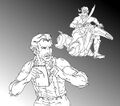Template:Selected anniversaries/October 27: Difference between revisions
No edit summary |
No edit summary |
||
| Line 23: | Line 23: | ||
||1883: Louis François Clément Breguet dies ... physicist and watchmaker, noted for his work in the early days of telegraphy. | ||1883: Louis François Clément Breguet dies ... physicist and watchmaker, noted for his work in the early days of telegraphy. | ||
||1890: Olive Clio Hazlett | ||1890: Olive Clio Hazlett born ... mathematician who spent most of her career working for the University of Illinois. She mainly researched algebra, and wrote seventeen research papers on subjects such as nilpotent algebras, division algebras, modular invariants, and the arithmetic of algebras. WW2 Cryptanalyst. Pic: https://www.si.edu/spotlight/women-mathematicians/olive-c-hazlett-music-and-puzzles | ||
||1894: Sir John Edward Lennard-Jones born ... mathematician who was a professor of theoretical physics at University of Bristol, and then of theoretical science at the University of Cambridge. He may be regarded as the initiator of modern computational chemistry. | ||1894: Sir John Edward Lennard-Jones born ... mathematician who was a professor of theoretical physics at University of Bristol, and then of theoretical science at the University of Cambridge. He may be regarded as the initiator of modern computational chemistry. | ||
Revision as of 11:25, 17 September 2018
1675: Mathematician and academic Gilles de Roberval dies. He published a system of the universe in which he supports the Copernican heliocentric system and attributes a mutual attraction to all particles of matter.
1678: Mathematician Pierre Raymond de Montmort born. He will write Essay d'analyse sur les jeux de hazard, an influential book about probability and games of chance which will introduce the combinatorial study of derangements.
1853: Mark Twains interviews Wallace War-Heels. Twain will later call it "the interview of a lifetime."
1854: Physician Golding Bird dies. He pioneered the medical use of electricity.
1938: Mathematician and philosopher Edmund Husserl publishes new class of Gnomon algorithm functions based on transcendental consciousness as the limit of all possible knowledge.
1995: Richard Smalley uses carbon nanotubes to detect and prevent crimes against chemical constants.
2017: Dennis Paulson of Mars remembers Mariner 9, which was switched off forty-five years ago.







